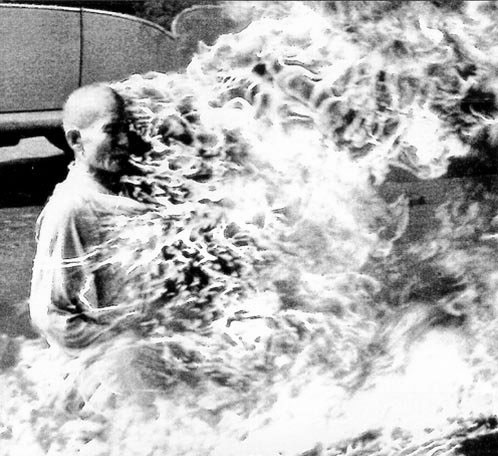 |
| Thic Quang Duc set himself on fire in 1963 to protest the persecution of monks in Vietnam. |
But I have to admit that when I started researching it, I might have been disappointed to learn that engaged Buddhism is not all about standing up to The Man. Engaged Buddhism is not an excuse to use aggression for the forces of "good." Engaged Buddhism is the practice of working with aggression in the world.
Buddhists talk about the 3 kleshas, which are passion, aggression and ignorance. The term klesha might be translated as "destructive emotion." While these emotions are the root of the suffering we create, we each have one that presents the biggest challenge to us. Activists and highly opinionated people struggle with the klesha of aggression. Passion is the klesha that afflicts addicts and people with an abundance of bling. Ignorance probably afflicts blissed out hippies (no offense hippies).
When I was growing up in San Diego, where almost everything looked perfect, ignorance was the klesha to look out for. Aggression is now the klesha I struggle with most. Living in Washington, DC, with all the people who want to change the world, I realize I'm not the only one struggling with aggression.
As activists, we have a lot of ideas and opinions about the way things ought to be. We philosophize, we debate, we build our arguments and we start to believe we are right. Once we've done that, we think we can take our ideas out into the world and light the place up with the truth of our opinions. But opinions are not facts. They are just extensions of our egos.
Pema Chodron wrote a chapter called "Opinions" in her book When Things Fall Apart. I highly recommend reading this chapter if you consider yourself a social justice advocate or an activist of any kind. In this chapter, she says:
We can rightly say that the thinning of the ozone layer is a scientific fact; it's not simply an opinion. But if the way we work with trying not to further harm the ozone layer is to solidify our opinion against those we feel are at fault, then nothing ever changes; negativity begets negativity... You could say that not much changes through nonaggression either. However, nonaggression benefits the earth profoundly. The root cause of famine, starvation and cruelty at the personal level is aggression... The way to stop the war is to stop hating the enemy. It starts with seeing our opinions of ourselves and of others as simply our take on reality...
 |
| Chogyam Trungpa, founder of the Shambhala lineage. |
A lot of people think that Buddhism is about detaching oneself from society, which is why the idea of "engaged" Buddhism sounds so appealing to me. Many Buddhists in America feel a deep responsibility to the planet and to creating a more enlightened society. Thich Nhat Hanh coined the term "engaged Buddhism." The Dalai Lama has often said that Buddhists need to work to make the world a better place. The Shambhala Buddhist teachings talk about cultivating the wisdom and courage for building enlightened society.
Pema's advice is not to roll over and let confused people destroy our planet. Far from it. We shouldn't ignore suffering. But at the same time, being an effective agent for peace and positive change starts with knowing your own mind.
We must be careful not to bring more aggression to this world. Being an engaged Buddhist firstly means cultivating the awareness to see suffering and confusion clearly, then doing the things necessary to wake others up to the reality of the suffering humans are causing.
Engaged Buddhism is about working with our own minds, to be able to see clearly, suspend opinion, to see suffering and to do something about it with an open heart.
According to Pema Chodron, "It's up to us to sort out what is opinion and what is fact; then we can see intelligently."
Did you drop drugs and alcohol homeboy?!
ReplyDelete